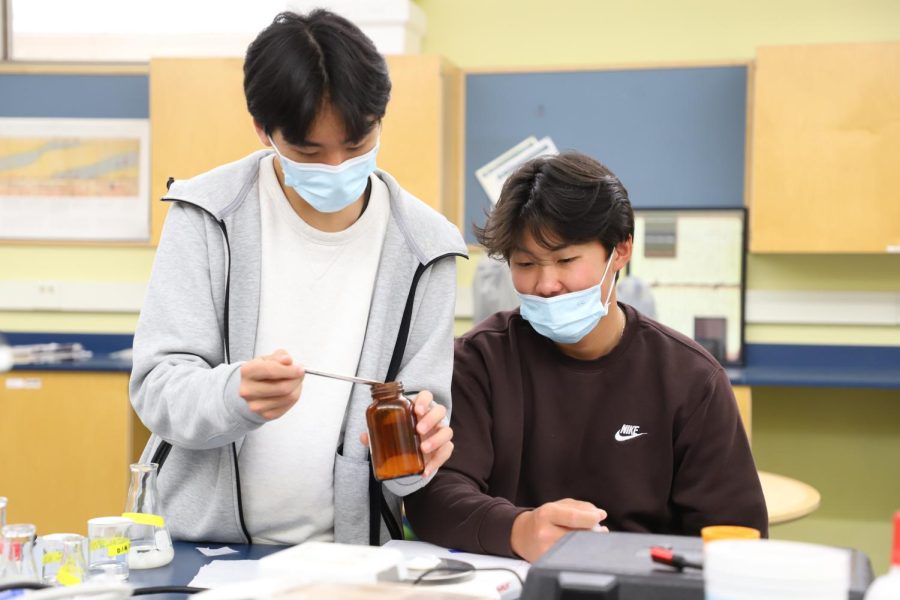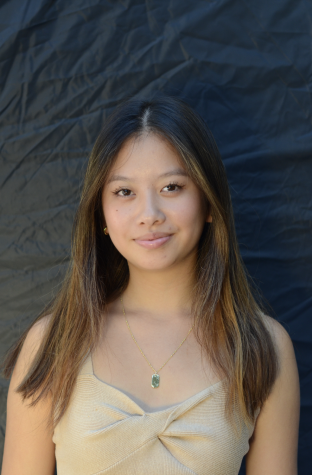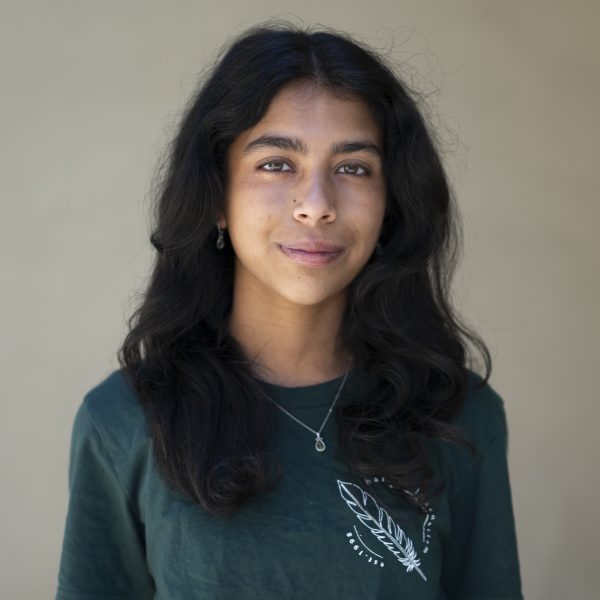Students attend and prepare for annual research events despite COVID-19 restrictions
Adrian Liu (10) works on his project with help from Jonathan Zhang (10). Adrian plans to present his research on biopolymer drug delivery for fibrosis treatment at the annual Research Symposium, which is organized by the WiSTEM (Women in STEM) club.
March 22, 2022
Upper school students competed in the annual Synopsys Science & Technology Championship on March 10. Meanwhile, Women in STEM (WiSTEM) Club is currently preparing for the annual Research Symposium on April 16.
The science fair invited student researchers to present their findings to a panel of judges during 15-minute judging sessions. Like the previous two years, the championship took place online due to COVID-19. Harker sponsored around 45 projects this year, according to upper school science research teacher Chris Spenner, who admires student growth and ability to adapt despite COVID-19 restrictions.
“My favorite part is when students are brave enough to attempt a project that is connected to something bigger,” Spenner said. “They’re picking projects that are relevant to these really big complex problems, and it’s not that we hope to solve them with this project, but we have learned something more about that problem and start to chip away at it.”
For the past few weeks, WiSTEM has been organizing the Symposium, and with the event’s in-person format, the club has been working to ensure that safety precautions are met. At Symposium, themed “STEM Will Save Us” this year, high school and middle school students are invited to present their work as either poster or speaker sessions and will explore how STEM topics such as climate change and cybersecurity affect our day-to-day lives. In addition, WiSTEM officers organize activity stations, where attendees can perform various science experiments.
“For the younger students, [we hope Symposium] can show them how expansive science can be and allow them to foster a love of science and show them the different opportunities,” WiSTEM STEM Buddies Lead Arissa Huda (11) said. “For the student researchers, it definitely is a really great way of practicing presentation skills. Symposium also allows the entire community to just see how much hard work and dedication students put into [their research].”


















![“[Building nerf blasters] became this outlet of creativity for me that hasn't been matched by anything else. The process [of] making a build complete to your desire is such a painstakingly difficult process, but I've had to learn from [the skills needed from] soldering to proper painting. There's so many different options for everything, if you think about it, it exists. The best part is [that] if it doesn't exist, you can build it yourself," Ishaan Parate said.](https://harkeraquila.com/wp-content/uploads/2022/08/DSC_8149-900x604.jpg)




![“When I came into high school, I was ready to be a follower. But DECA was a game changer for me. It helped me overcome my fear of public speaking, and it's played such a major role in who I've become today. To be able to successfully lead a chapter of 150 students, an officer team and be one of the upperclassmen I once really admired is something I'm [really] proud of,” Anvitha Tummala ('21) said.](https://harkeraquila.com/wp-content/uploads/2021/07/Screen-Shot-2021-07-25-at-9.50.05-AM-900x594.png)







![“I think getting up in the morning and having a sense of purpose [is exciting]. I think without a certain amount of drive, life is kind of obsolete and mundane, and I think having that every single day is what makes each day unique and kind of makes life exciting,” Neymika Jain (12) said.](https://harkeraquila.com/wp-content/uploads/2017/06/Screen-Shot-2017-06-03-at-4.54.16-PM.png)








![“My slogan is ‘slow feet, don’t eat, and I’m hungry.’ You need to run fast to get where you are–you aren't going to get those championships if you aren't fast,” Angel Cervantes (12) said. “I want to do well in school on my tests and in track and win championships for my team. I live by that, [and] I can do that anywhere: in the classroom or on the field.”](https://harkeraquila.com/wp-content/uploads/2018/06/DSC5146-900x601.jpg)
![“[Volleyball has] taught me how to fall correctly, and another thing it taught is that you don’t have to be the best at something to be good at it. If you just hit the ball in a smart way, then it still scores points and you’re good at it. You could be a background player and still make a much bigger impact on the team than you would think,” Anya Gert (’20) said.](https://harkeraquila.com/wp-content/uploads/2020/06/AnnaGert_JinTuan_HoHPhotoEdited-600x900.jpeg)

![“I'm not nearly there yet, but [my confidence has] definitely been getting better since I was pretty shy and timid coming into Harker my freshman year. I know that there's a lot of people that are really confident in what they do, and I really admire them. Everyone's so driven and that has really pushed me to kind of try to find my own place in high school and be more confident,” Alyssa Huang (’20) said.](https://harkeraquila.com/wp-content/uploads/2020/06/AlyssaHuang_EmilyChen_HoHPhoto-900x749.jpeg)








